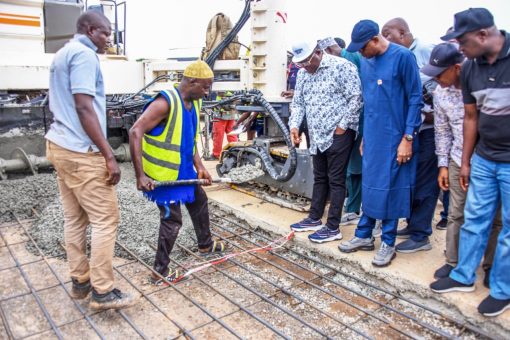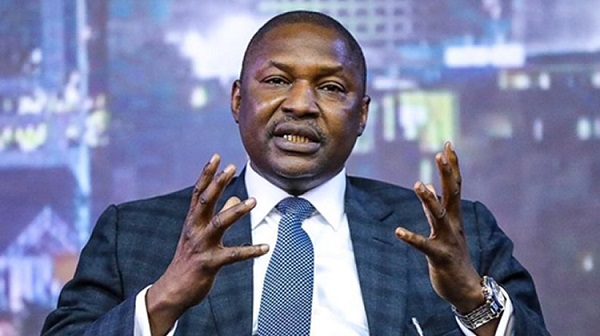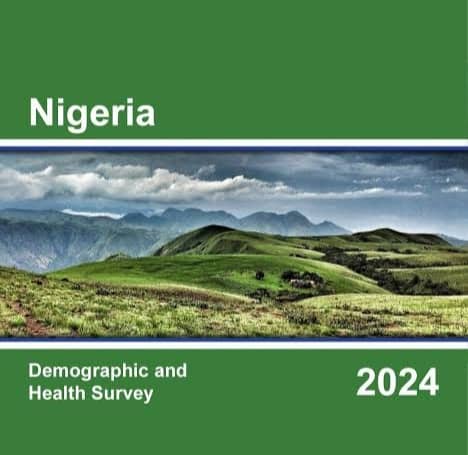News
Fed. Govt. injects fresh N761 billion into Abuja–Kano road project

The Federal Government has reiterated commitment to the timely completion of the Abuja–Kaduna–Zaria–Kano expressway, describing it as a legacy infrastructure project that will serve future generations.
Speaking during a site inspection on Saturday, the Minister of Works, David Umahi also assured that the 14-month completion period of the project remains achievable.
According to him, Sections 1 and 3 of the project, covering a combined 118 kilometers, were awarded for ₦252 billion, with the President already approving a 30 percent payment of about ₦60 billion.
Section 2, he explained, covers 72 kilometers by two lanes, with 15 kilometers designed as flexible asphalt pavement and the rest reinforced concrete.
The total cost for Section 2 is ₦507 billion, of which 30 percent (over ₦150 billion) has been disbursed, he revealed, noting, “When combined, the project up to Kano amounts to about ₦761 billion, which is highly courageous.
“I commend the President for his interest in building these roads,” the Minister said.
He added that the initiative has been tagged ‘Rebuilding Abuja–Kaduna–Zaria–Kano Road by President Bola Tinubu’, noting that the President has made its completion a funding priority.
The Minister emphasised that the current construction, unlike earlier works that dragged on for years, is designed to last for more than a century.
“We are very happy and assured that the roads being built by the present administration will last for over a hundred years. It is a legacy we will leave for incoming generations, as there will be no need to rebuild them again,” he affirmed, urging contractors to deliver quality work.
He further revealed that President Tinubu has directed that the standard of road infrastructure in the South-West, with all accompanying facilities, should be replicated in the North.
“We want to commend the contractors, but we also frown seriously because my integrity is at stake if we don’t complete the project in 14 months,” he warned.
The Minister urged young Nigerian engineers to embrace modern innovations in road construction, while also highlighting the President’s directive that all NNPC-funded projects must not be abandoned.
“We are going to prioritize them, and contractors will work based on milestones, not just certificates,” he explained.
Umahi emphasized the importance of monitoring and evaluation in road projects, stressing that on-the-ground supervision is essential to the success of any engineering project.
“We can’t stay in the office and know what is going on in the field. Site inspection and sharing ideas are key to the success of any engineering project,” he said.
Minister of State for Works, Alhaji Garba Umar Goronyo, commended the contractors for the progress made so far and urged them to intensify efforts to meet deadlines, especially after delays caused by the rainy season.
“People are anxious for the timely completion of this project,” Goronyo said, stressing that durable roads and bridges remain critical drivers of Nigeria’s Gross Domestic Product growth.
News
Washington attack: US orders review of all Green Cards from 19 countries

The United States government has announced a sweeping review of all Green Cards issued to citizens of 19 countries, following Wednesday’s attack on National Guard troops in Washington, D.C.
The Trump administration disclosed the move on Thursday after authorities identified the detained suspect as a 29-year-old Afghan national who had previously worked with American forces in Afghanistan.
According to AfghanEvac, an organisation involved in the resettlement of Afghans after the 2021 Taliban takeover, the suspect was granted asylum in April 2025, not permanent residency.
In a statement on X, the Director of the US Citizenship and Immigration Services (USCIS), Joseph Edlow, said, “I have directed a full-scale, rigorous re-examination of every Green Card for every alien from every country of concern.”
The order had earlier banned nearly all nationals from 12 of those countries, including Afghanistan, from entering the United States.
Here is a full list of countries under the travel ban:
Countries with Full Travel Ban (12)
1. Afghanistan
2. Myanmar
3. Chad
4. Congo-Brazzaville
5. Equatorial Guinea
6. Eritrea
7. Haiti
8. Iran
9. Libya
10. Somalia
11. Sudan
12. Yemen
Countries with Partial Ban (7)
1. Burundi
2. Cuba
3. Laos
4. Sierra Leone
5. Togo
6. Turkmenistan
7. Venezuela
News
EFCC summons ex-AGF Malami

The Economic and Financial Crimes Commission (EFCC) has invited former Attorney-General of the Federation and Minister of Justice, Abubakar Malami, for questioning.
Malami served as Attorney-General and Minister of Justice from 2015 to 2023 under former President Muhammadu Buhari.
Malami announced the development on his Facebook page on Friday, confirming that he had received a formal invitation from the anti-graft agency.
“I would like to inform my family and friends that I have been summoned by the EFCC to provide clarification on certain matters, and as a law-abiding and patriotic citizen, I am determined to honour this invitation without any hesitation,” he wrote.
The former minister reiterated his commitment to the principles of honesty, integrity, and accountability, which he said guided his years in public service.
“I believe in the importance of honesty, integrity, and accountability in governance; these are principles that I have long supported and upheld over the years of my public service,” he added.
Malami also stated that he would keep Nigerians informed of any developments that may arise from the invitation.
News
NDHS: Nigerian regions show huge disparity in spousal earnings

• South South most equal
By Grace Edet
New data from the 2024 Nigeria Demographic and Health Survey (NDHS) has revealed major regional disparities in spousal earnings, showing that most Nigerian wives aged 15–49 earn less than their husbands, despite growing pockets of income equality across the country.
According to figures shared by Statisense on Tuesday, the trend is most pronounced in the North-West, where 941 in 1,000 wives earn less than their husbands, while only 29 in 1,000 earn more. The region also recorded the lowest rate of non-earning husbands, with just 7 in 1,000 women reporting partners with no income.
In contrast, the South South posted the strongest levels of income parity. The region recorded 113 in 1,000 wives earning the same as their husbands, the highest nationwide. It also had the largest share of women earning more than their spouses at 61 in 1,000.
The North East also showed notable shifts. While 30 in 1,000 wives out-earn their husbands, one of the highest shares in the country, the region still reported that 888 in 1,000 women earn less, reflecting wide inequality despite emerging improvements.
The North Central displayed more balanced figures, with 46 in 1,000 women earning more, and 65 in 1,000 earning equally, though 848 in 1,000 wives still fall below their husbands’ income levels.
In the South East, income gaps remain significant but show signs of narrowing. The data shows 57 in 1,000 wives earn more, 82 in 1,000 earn equally, while 775 in 1,000 still earn less than their husbands.
For the South West, 45 in 1,000 wives earn more, and 75 in 1,000 earn the same, but 824 in 1,000 wives still earn below their husbands’ earnings. Only 11 in 1,000 husbands reported having no income.
The NDHS 2024 findings highlight a consistent national pattern: while traditional income structures remain strong, especially in northern regions, the southern zones, particularly the South South, are showing faster shifts toward income equality within households.
Experts say the trend reflects broader economic realities, including rising female participation in formal work, regional differences in literacy levels, and contrasting socio-cultural expectations about household roles.
The full survey continues to shape policy discussions on women’s economic empowerment, labour participation, and regional development priorities.
-

 Art & Life9 years ago
Art & Life9 years agoThese ’90s fashion trends are making a comeback in 2017
-

 Entertainment9 years ago
Entertainment9 years agoThe final 6 ‘Game of Thrones’ episodes might feel like a full season
-

 Art & Life9 years ago
Art & Life9 years agoAccording to Dior Couture, this taboo fashion accessory is back
-

 Business9 years ago
Business9 years agoThe 9 worst mistakes you can ever make at work
-

 Entertainment9 years ago
Entertainment9 years agoThe old and New Edition cast comes together to perform
-

 Sports9 years ago
Sports9 years agoPhillies’ Aaron Altherr makes mind-boggling barehanded play
-

 Entertainment9 years ago
Entertainment9 years agoMod turns ‘Counter-Strike’ into a ‘Tekken’ clone with fighting chickens
-

 Entertainment9 years ago
Entertainment9 years agoDisney’s live-action Aladdin finally finds its stars





